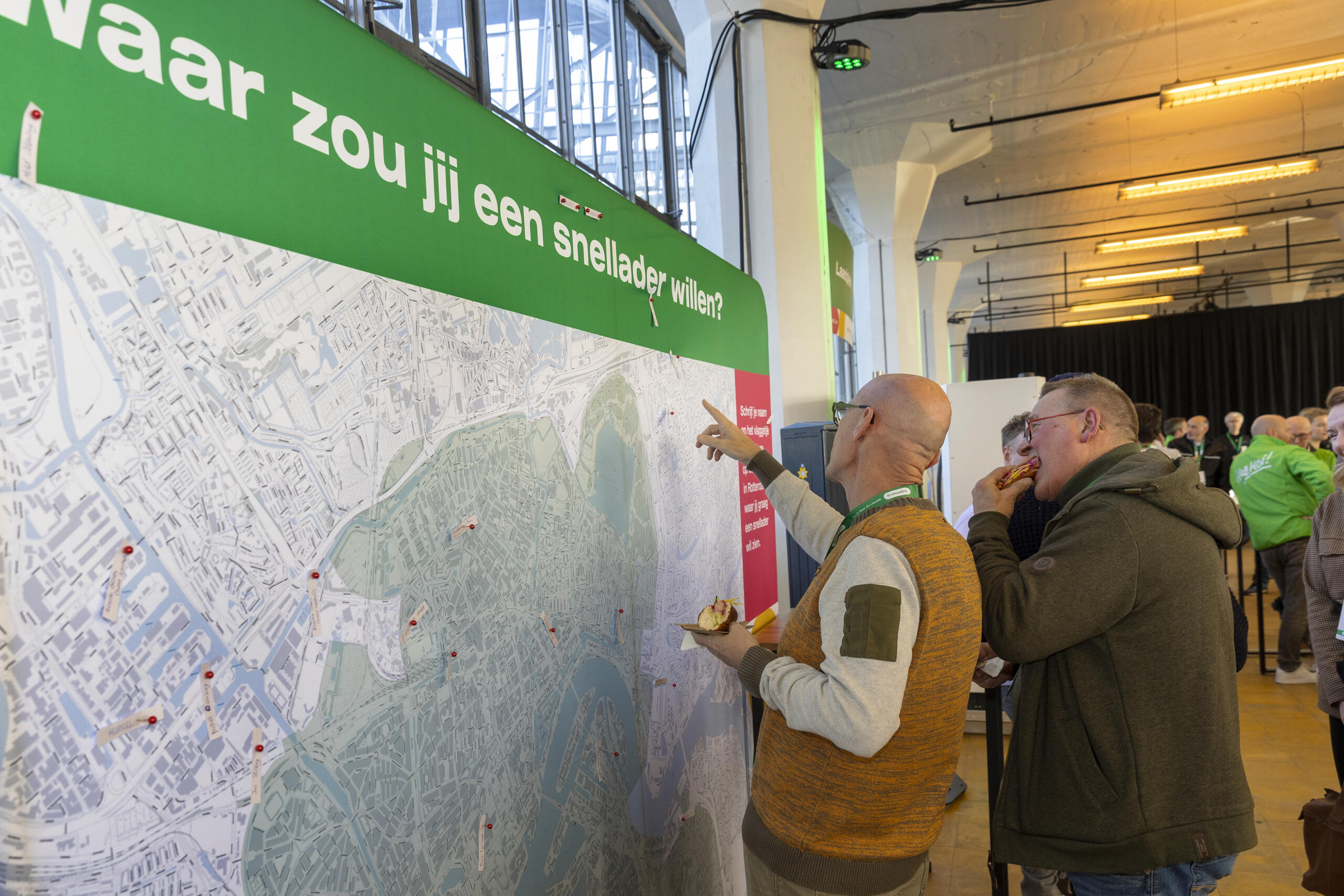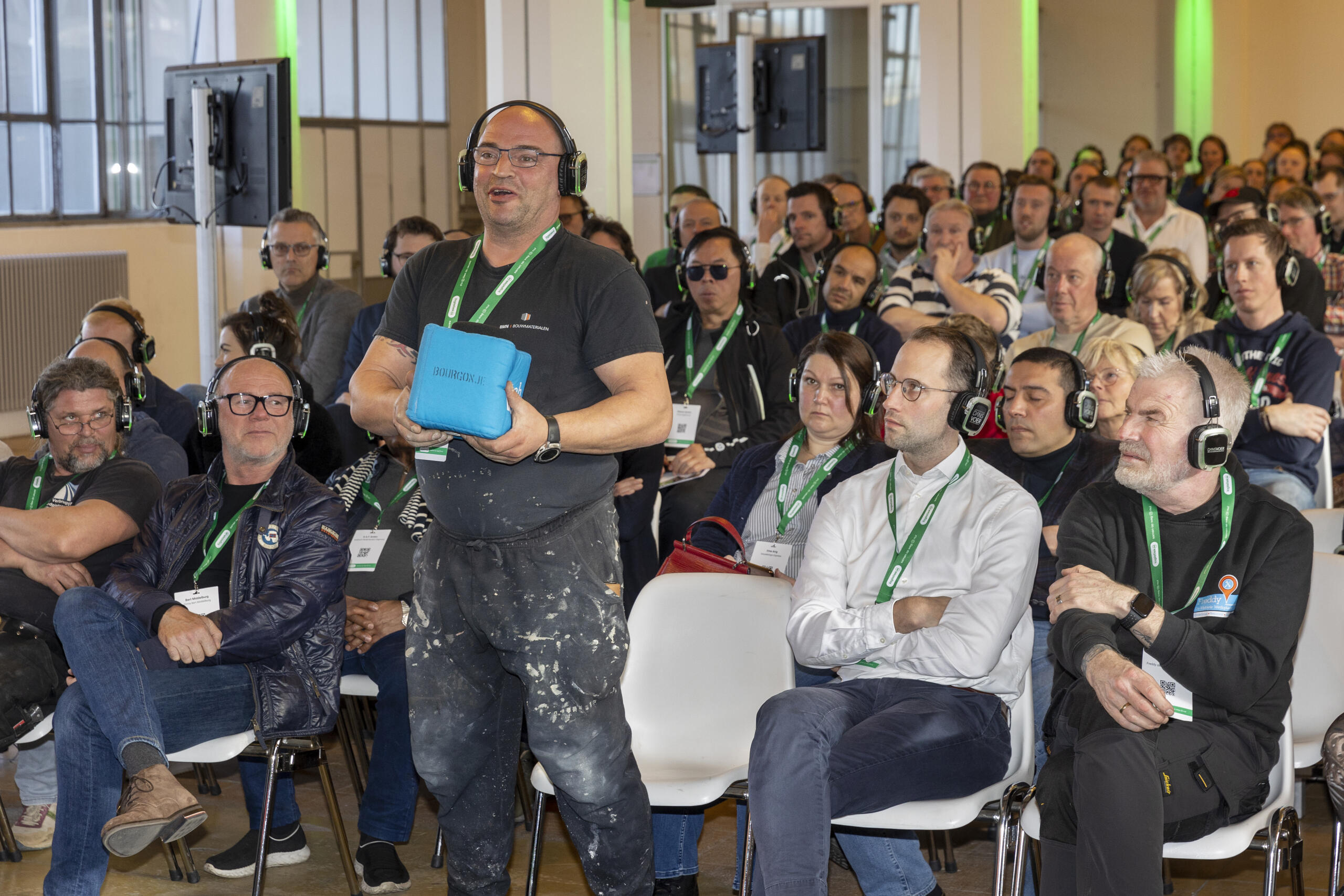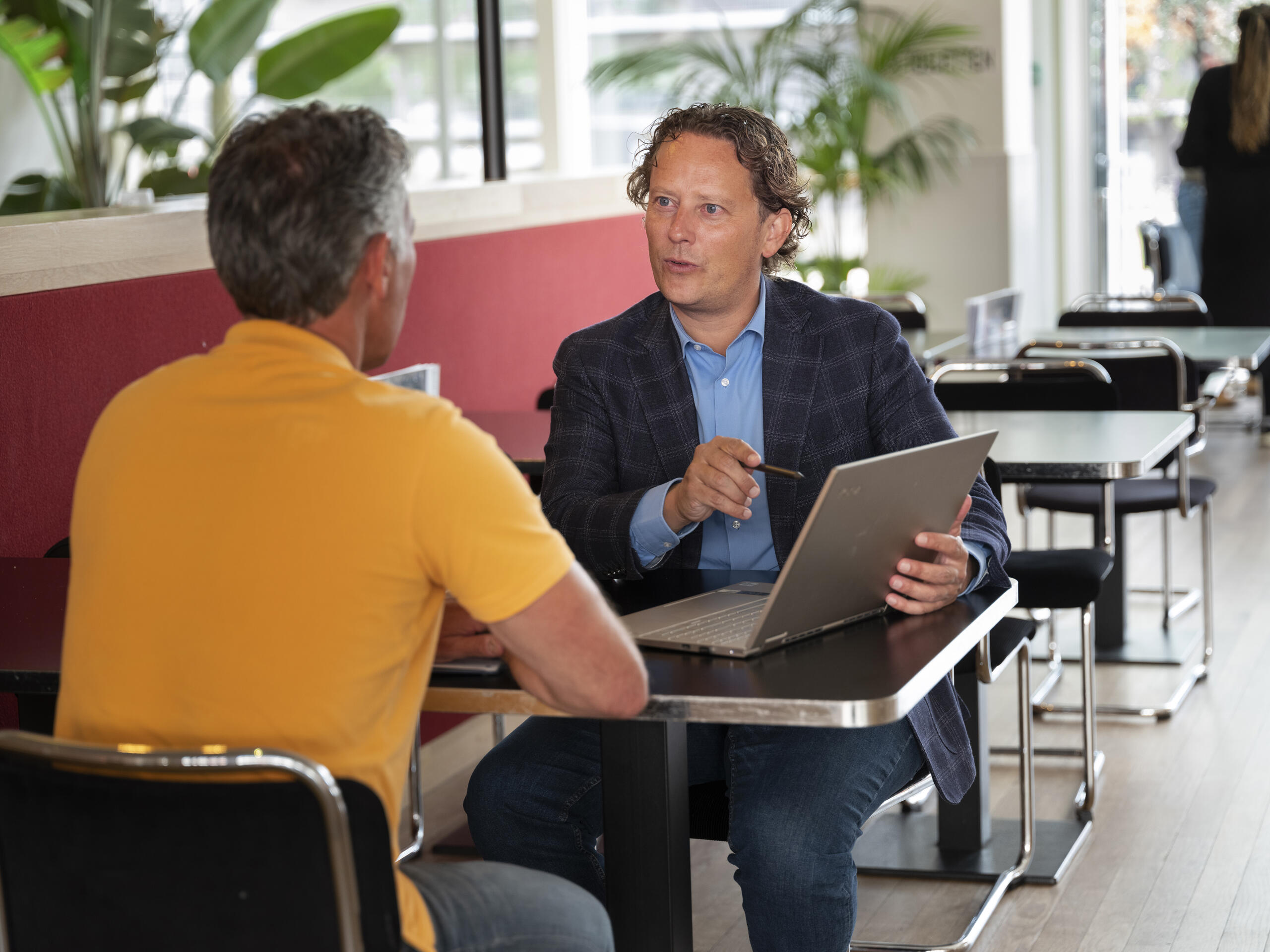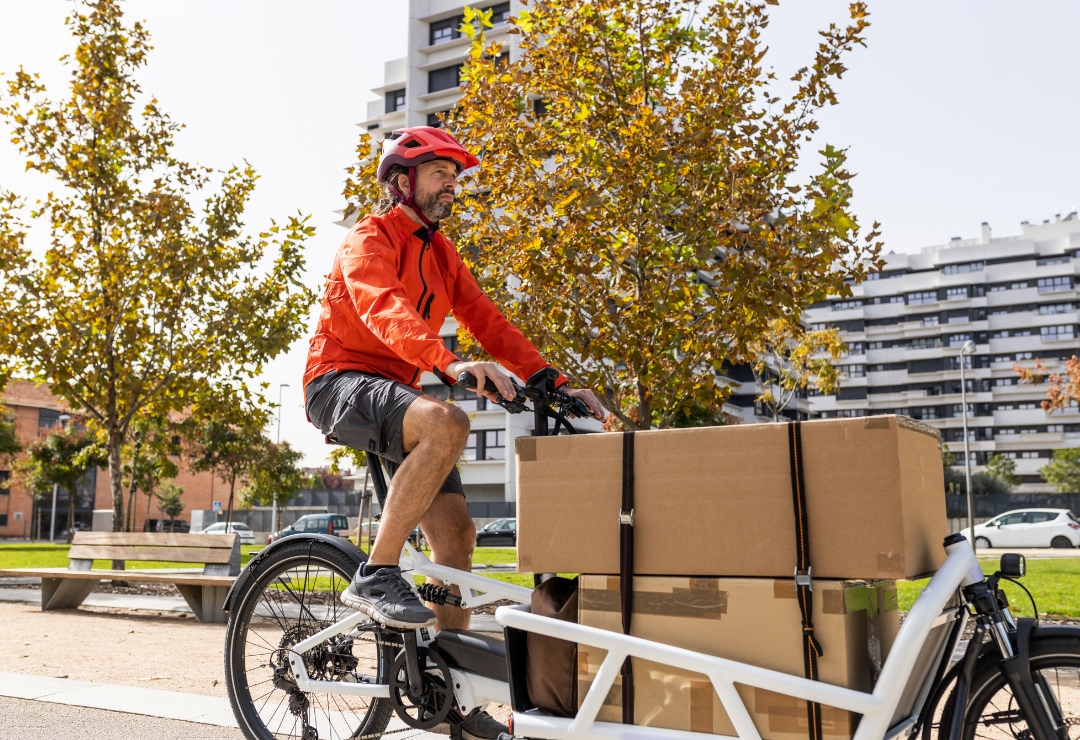Rotterdam Roadmap
Rotterdam has been at the forefront of sustainable city logistics for nearly a decade. Since the Green Deal City Logistics Rotterdam in 2014, the City has worked diligently towards the implementation of a Zero Emission Zone for city logistics in 2025. This illustrates Rotterdam's commitment to combatting climate change, reducing air pollution, and creating a cleaner, healthier urban environment for residents and visitors.
To listen to the recording of the article below, please accept all cookies.
Rotterdam’s commitment to sustainable city logistics extends beyond policy and planning — it is founded on a robust community of stakeholders dedicated towards that common goal. The heart of this community is the Logistiek010 platform. This is a dynamic hub where over 2,800 organisations converge to share knowledge, exchange best practices, and collaboratively advance towards sustainable city logistics. Most community members are companies shipping, receiving, or transporting goods, but also governments, educational institutions, vehicle manufacturers, and financial service providers.
Moreover, the Ecostars program serves as a testament to Rotterdam’s inclusive strategy, motivating and supporting more than 1000 SMEs to transition toward a more environmentally conscious business model. This includes the shift toward emission-free transport and on top of that the exploration of ways to achieve a more efficient modus operandi.
Additionally, the Covenant ZECL serves as a guiding agreement that unites various entities in their pursuit of zero-emission urban logistics, fostering collaboration and accountability. This illustrates how Rotterdam tries to unite its diverse stakeholders in putting a joint vision of sustainable logistics into practice.
National Policy Framework
The local effort (with urban air quality as the main driver for change) got an important boost when the Dutch National Climate Agreement was established in 2018 and CO2 emissions by freight traffic entered into the equation. Over a hundred parties committed to implementing Zero-Emission Zones for city logistics by the year 2025.
A nationwide implementation plan (UAS) for the coordinated and harmonised introduction of Zero Emission Zones for urban logistics in 30 to 40 cities in the Netherlands was put into action. Led by the Ministry of Infrastructure and Water Management, several working groups address specific aspects of the UAS. Rotterdam actively participates in most of those.
Roadmap, covenant, and monitor
The way Rotterdam shaped its Roadmap ZECL (2019) and subsequent Covenant ZECL (2020) structures the interaction between all parties involved. Its role as Covenant secretary puts Rotterdam in a position to efficiently gather essential insights via monitoring and research.

Current and aspiring EV-drivers share their preferred locations for implementing public, fast-charging infrastructure. Credit: City of Rotterdam
This provides the basis for the development and implementation of effective flanking policies aimed at helping stakeholders in the required transition. Additionally, an extensive communication and community-building campaign is carried out through its rapidly growing platform Logistiek010.
With approximately one year remaining until the implementation of access restrictions, the time is right to evaluate the outcomes of the covenant signed three years ago, involving 56 stakeholders. Over time, the covenant has grown to 75 partners, all of whom have formulated numerous actions to accelerate the transition. Altogether, the covenant currently includes over 400 distinct actions, measures, pilot projects and initiatives, each of which the partners provide frequent progress updates for, which are consolidated into the annual State of ZECL report.
Addressing new challenges
In the inaugural edition of the State of ZECL, it was noted that numerous actions deemed innovative in 2020 had already evolved into standard practices by 2021. In the 2022 edition, many initiatives reached a level of maturity, yet certain challenges persisted, prompting the city of Rotterdam to initiate new and targeted efforts in response.
A primary issue is that the introduction of the ZE-zone raises many questions for small and medium-sized enterprises. The Ecostars program, tailored to assist these SMEs, is highly valued by many stakeholders because of its approach. A nice spin-off is that witnessing other entrepreneurs take progressive actions provides concrete inspiration for their peers.
While SMEs and self-employed individuals typically exhibit a more conservative approach, they tend to respond positively when allowed to try out an LEV or electric delivery van. The try-out arrangement, which is part of the Ecostars program, has therefore been actively promoted at the Plug In 010 event held on 30 March 2023. It was well attended by the target group of SMEs (over 50% of the 400 visitors). At the event, local business owners could explore and test a wide range of these vehicles.
Inspiring synergies
Covenant partners adapt their business strategies to zero-emission urban logistics and wider societal shifts in various ways. Some broaden their horizons and explore new paths, while others focus on their distinct areas of expertise and strengths. The Covenant ZECL serves as a catalyst, facilitating connections among forward-thinking entrepreneurs, and encouraging them to embark on innovative ventures. Rotterdam has launched the local Lab ZES subsidy program to support these initiatives.
Consequently, on a small scale, there is a lot of experimentation with new concepts. Often, the required transition can be achieved within a company's operations. However, there are also an increasing number of service providers who can play a role in this. Hubs are frequently mentioned as a solution to logistical challenges. In practice, it is challenging for new initiatives to gain traction. Achieving the critical revenue volume necessary to make the hub concept a profitable business model is difficult. Companies operating within existing flows and/or partnerships are currently more successful.

Local business owners attending the annual Plug-In 010 event. Credit: City of Rotterdam
In various instances, Rotterdam takes on a supportive role in mobilizing the necessary partners and processes for these new concepts. While some of these initiatives naturally gain momentum independently, others require specific assistance from the city. This is particularly the case in white-label asset-sharing initiatives that take place in public spaces.
In other cases, stakeholders proactively engage the city in the initiation of new projects. This is exemplified by the Advisory Board on City Logistics, which offers both solicited and unsolicited advice to the city and was established through the joint efforts of three prominent industry associations. To date, it has been highly effective in providing the city with valuable, direct insights across various policy domains. It has also contributed to the launching of a research pilot, exploring the efficiency gain potential in making better use of time windows for delivery in pedestrian areas.
Moreover, numerous thematic working groups and initiatives have been established to i.e. support SMEs, facilitate the sharing of logistical data, and develop policy tools such as logistical simulation models. Additionally, addressing the energy supply necessary to power this transition has its dedicated thematic working group, along with multiple projects aimed at assisting businesses in realising and potentially sharing their charging infrastructure.
Data collection and analysis
Rotterdam's systematic engagement with logistics stakeholders in the development and assessment of urban freight policies yields valuable, in-depth insights into the functioning of the urban logistics ecosystem. This engagement with 75 covenant partners and their implementation of over 400 actions brings together perspectives from experienced pioneers.

A local entrepreneur stays informed about the upcoming ZEZ and receives personalised advice on navigating the way forward. Credit: City of Rotterdam
Additionally, the Ecostars program has provided a database comprising information on over 1000 companies (mainly SMEs), their profiles, and their perspectives on this transition. Meanwhile, the Logistics010 community, consisting of over 2,800 companies and organizations, not only stays informed but is also regularly consulted for their input on relevant topics.
This information is supplemented by traffic monitoring data. Within the mobility department, the logistics team collaborates closely with the data and modelling cluster. A joint effort is made to improve the collected data in such a way that freight traffic is adequately represented within traffic models. These insights and tools are subsequently shared with national and regional partners to support their policy development efforts. This is particularly relevant given that all 29 announced zero-emission zones (ZEZ) follow uniform access regulations and a centralised exemption scheme applicable to all Dutch cities.
Lessons learned
The lessons learned, especially in the three years since the signing of the Covenant, are endless. If there is one thing to take away it is that, although the personal approach is time-consuming, it pays off in support, both politically and with the target group.
Click here to read the article in its original format.
About the authors:
Tim Sjouke is an Advisor on Zero Emission Urban Logistics for the City of Rotterdam. He graduated from the Rotterdam University of Applied Sciences as a Civil Engineer, specialising in infrastructure and mobility. After a traineeship at the city of Rotterdam, he started working on the introduction of the zero-emission zone for city logistics. His mission is to achieve inclusive and data-driven policymaking.
Jos Streng works on the BuyZET Project for the City of Rotterdam’s Traffic and Transport Department. He graduated as a hydrologist from the Agricultural University of Wageningen. Following the global urbanisation trend, his attention shifted from rural to urban areas, and from the flow of water to the flow of traffic. Within the logistics cluster of Rotterdam’s mobility department, his focus is on research, policy development, and collaboration at the national and international levels.
